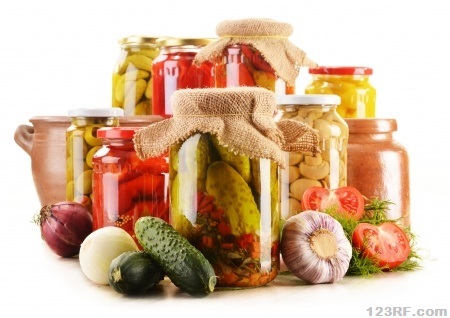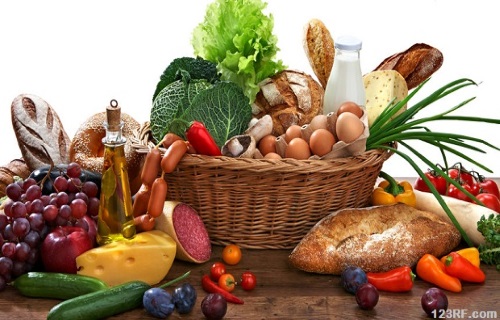Preserved Foods To Survive Winter
Especially if you live in an area where the weather will be bad, you’ll need to stockpile enough food to get you and your family through the winter. This can be a daunting task until you do it a few times and get used to tallying in your head how much you’ll need.
In the following paragraphs, we’re going to talk a bit about the top foods that you need to preserve and stockpile to get your family through the winter.
How Long Are You Stockpiling For?
The first thing that you need to do is decide how long you’ll need to preserve food for. Remember that just because it stops snowing in March or so, you won’t have fresh crops for at least another month after that, assuming you start your plants inside.
What happens if we lose power indefinitely — foods that require freezing or refrigeration for long term storage are going to go bad? Emergency food storage in advance will be the only way to feed yourself and your family.
How Many People Are in Your Family?
{adinserter emp}You also need to consider how many people you’re stockpiling for.
The average person needs at least 1200 calories per day to maintain weight, and if there’s work involved, that number is closer to 2000.
Some people prefer to use amounts rather than numbers; in other words, you want to have enough food to make at least 2 good meals per day for the entire winter.
Look at the Nutritional Value in Foods
The next thing that you need to consider is the nutritional value of food. You want to preserve a variety of foods so that you’re getting a variety of nutrients. You need fat, carbohydrates and protein to live, along with numerous vitamins and minerals.
Canning a variety of colorful fruits and veggies will help you meet your nutritional needs. You’ll need meat, nuts or seeds, or beans, too, to meet your protein requirements.
It’s safe to assume that each person in your house will eat 1 cup of veggies twice per day, and about 1/2 cup of fruits. As far as protein goes, you need at least 30 grams per day to meet your requirements.
That equals 1 pint of veggies and 2 servings of lean meat per day, plus your fruit. You’ll likely want to can “luxury” items too, such as pie fillings and jams. They boost morale and add a bit of sweetness to what may be a dreary existence.

Special Dietary Needs
Finally, you need to consider the special requirements of family members who may have such conditions as diabetes; the time may come when you need to control the disease with diet and exercise only so be sure that you have plenty of the foods that you or your loved one will need.
When you’re preserving your veggies, try to do so in a manner that won’t overcook them. Pack them raw and don’t cook them longer than you need to in order to get the jars to seal in order to keep from destroying valuable nutrients. A good indicator is that green foods lose nutritional value when they lose that beautiful bright green color.
Remember, too, that you can supplement with dried goods: rice, beans, flour, sugar, corn meal, granola bars and boxed goods such as instant mashed potatoes.
These are great for adding bulk but be careful, especially if you have limited space, to only stockpile what you’ll need. Just because it’s on sale or even free, there’s no reason to stockpile 100 pounds of rice unless you have a huge family or are planning to share.
Now, what are some of the foods that give you the most nutritional bang for your buck? Here’s a list to help you get started, whether you’re growing your food, then canning it, or whether you’re buying it at the store. Home-preserved foods are, of course, best because you know exactly what’s in them.
What to Stockpile for Winter
Veggies -This list is just a guide to the most nutritious vegetables available. If you don’t like something, or have a veggie that you love but don’t see on the list, feel free to add it to your stockpile.
- Beets
- Sweet potatoes
- Green Beans
- Spinach
- Greens, such as collard and dandelion
- Peppers, both bell and hot offer a wide array of nutrients
- Tomatoes, whole and juice
- Okra
- Asparagus
- Brussels Sprouts
Fruits -Most fruits are great for you and for most of them, you can dry them or can them to get the most longevity from your crops.
- Apples. You can store them fresh just like you do potatoes but be sure you have a cellar to do this or they’ll quickly rot. You’re better off canning them into apples, applesauce, apple pie filling, apple
 butter etc.
butter etc. - Orange juice. You need the vitamin C to keep you from getting rickets.
- Pineapples and juice – see above
- Cherries
- All berries – cranberries, blueberries, strawberries, blackberries and raspberries
- Peaches
- Raisins
- Mangoes
- Pears
- Pomegranates
- Prunes – nutritious and also valuable to help keep your bowels regular. A double whammy here – nutrition and medicinal uses.
Fats
- Coconut oil – unlike most fats, coconut oil is a medium-chain triglyceride which means that your body processes it faster; much like it does carbs but without the insulin spike. A great oil to stock for diabetics!
- Olive oil
- Butter – see our article about how to make and can butter at home.
Proteins – Meats are easy to can or you can make jerky. A combination of both is best, in the interest of having both portable foods and different flavors.
- Venison
- Oily fish
- Beef Jerky
- Chicken
- Turkey
- Sausage
- Beef
- Peanut butter or nut butter
- Nuts, especially walnuts
- Canned tuna
- Dried beans
- Brown Rice – when mixed with black beans or pinto beans, you have a complete protein.
- Protein bars
Condiments
- Ketchup
- Hot sauce
- Mustard
- Mayo
- Sugar
- Honey
- Maple Syrup
- Butter
- Fruit jellies. Shoot for berries because they’re rich in antioxidants and nutrients. Strawberry, blueberry, blackberry and raspberry are all great candidates.
- Pickles both dill and sweet
Spices
Have a wide variety of spices stockpiled because you can completely change the flavor profiles of food just by adding different seasonings. Here are a few that you should probably stock up on.
Remember though that you don’t need a ton of these because a little bit goes a long way. Consider also having an indoor herb garden if at all possible because fresh is always best!
- Italian seasoning
- Cumin
- Onion powder
- Garlic powder
- Cinnamon
- Allspice
- Ginger
- Cayenne pepper
- Cloves
- Cilantro
- Mustard seed
- Chili powder
- Basil
- Oregano
- Rosemary
- Thyme
- Dill
- Sage
- Salt
- Pepper
- Apple Cider Vinegar
These are, of course, just a basic list. Feel free to peruse your cabinets to help make a list of what you use the most, then make sure that you have them.
Perhaps the most important thing to keep in mind when you’re stockpiling foods to get you through the winter in a survivalist situation is that you need to like the food. Don’t buy things just because they’re on sale or free. That’s just a waste of space.
What you stockpile will also depend on whether you’re supplementing with store-bought foods or depending solely upon the fruits (and veggies) of your labors. All of the foods listed here can be canned, dried or both.
Dried fruits and veggies take up very little space and retain most of the nutritional value of the fresh fruit. They’re also portable so that makes it well worth the effort of drying them!
If you can think of anything that we’ve left off of the list, or if you have any questions, please let us know in the comments section below.
Word of the day: Prepare! And do it the old fashion way, like our fore-fathers did it and succeed long before us, because what lies ahead of us will require all the help we can get. Watch this video and learn the 3 skills that ensured our ancestors survival in hard times of famine and war.
SOURCE : thebytenews.com
Other useful resources:
The Lost Ways (Learn the long forgotten secrets that helped our forefathers survive famines,wars,economic crisis and anything else life threw at them)
Survival MD (Best Post Collapse First Aid Survival Guide Ever)
Backyard Innovator (A Self Sustaining Source Of Fresh Meat,Vegetables And Clean Drinking Water)
Blackout USA (EMP survival and preparedness)
Conquering the coming collapse (Financial advice and preparedness )
Liberty Generator (Build and make your own energy source)
Backyard Liberty (Easy and cheap DIY Aquaponic system to grow your organic and living food bank)
Bullet Proof Home (A Prepper’s Guide in Safeguarding a Home )
Family Self Defense (Best Self Defense Strategies For You And Your Family)
Survive Any Crisis (Best Items To Hoard For A Long Term Crisis)
Survive The End Days (Biggest Cover Up Of Our President)
Drought USA (Discover The Amazing Device That Turns Air Into Water)


